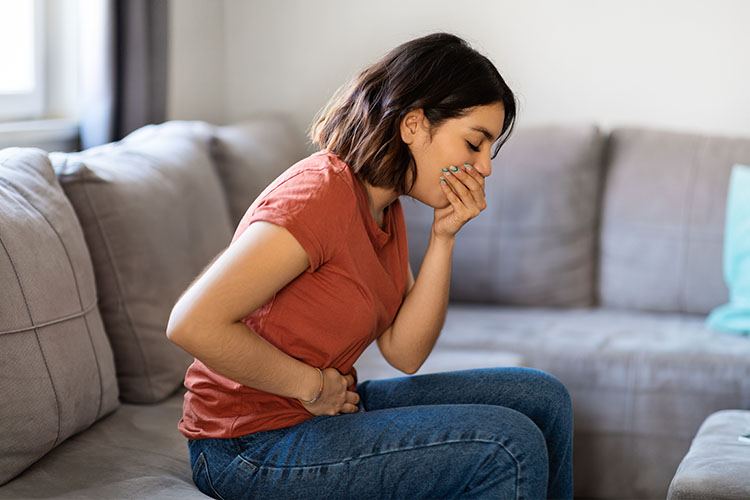Overview
Food poisoning is a common illness caused by consuming contaminated food or drinks. It occurs when food is infected with harmful bacteria, viruses, parasites, or toxins. Common culprits include Salmonella, E. coli, Listeria, and norovirus. Contamination can happen during food production, processing, or preparation, especially when food is not cooked thoroughly, stored properly, or handled with poor hygiene.
The effects of food poisoning can range from mild discomfort to severe health complications. Typical symptoms include nausea, vomiting, diarrhea, stomach cramps, and fever, which usually appear within hours or days after consuming contaminated food. In severe cases, food poisoning can lead to dehydration, kidney failure, or life-threatening conditions, particularly in vulnerable populations such as young children, the elderly, pregnant women, and individuals with weakened immune systems.
Treatment for food poisoning generally depends on the severity of the symptoms. For mild cases, rest, staying hydrated, and allowing the body to recover naturally are often sufficient. Over-the-counter medications like anti-diarrheal drugs or anti-nausea medications can help alleviate symptoms, but they should be used cautiously, as they may prolong the presence of toxins in the system. Severe cases, particularly those involving high fever, persistent vomiting, or signs of dehydration, require immediate medical attention and may involve intravenous fluids or antibiotics.
Preventing food poisoning involves practicing proper food safety measures, such as washing hands and surfaces regularly, cooking food to the recommended temperature, avoiding cross-contamination, and refrigerating perishable items promptly. Awareness and proactive food handling can significantly reduce the risk of foodborne illnesses and their associated complications.
Table of Contents
When to See a Doctor
While most cases of food poisoning resolve on their own within a few days, there are certain circumstances where seeking medical attention is necessary to prevent serious complications. If you or someone you know experiences any of the following, it’s important to consult a healthcare professional promptly.

Signs to see a doctor:
- Persistent vomiting or inability to keep fluids down. If vomiting continues for more than 24 hours, or if you cannot retain fluids, it increases the risk of severe dehydration, which requires medical intervention.
- Signs of severe dehydration. Symptoms like extreme thirst, dry mouth, infrequent urination, dark-colored urine, dizziness, or weakness are warning signs that the body lacks essential fluids and electrolytes.
- Blood in stool or vomit. The presence of blood can indicate a serious infection or intestinal damage that needs immediate evaluation and treatment.
- High fever. A temperature above 101.5°F (38.6°C) accompanied by other symptoms may suggest a bacterial or viral infection requiring medical attention.
- Prolonged symptoms. If diarrhea, stomach pain, or other symptoms persist beyond three days, it may indicate a more severe infection or condition that needs medical assessment.
- Symptoms in vulnerable populations. Pregnant women, young children, the elderly, or individuals with weakened immune systems should seek medical help even for mild symptoms, as they are at higher risk of complications.
- Neurological symptoms. Blurred vision, difficulty swallowing, muscle weakness, or tingling sensations may suggest a rare but serious condition like botulism, which requires urgent care.
Prompt medical attention can help address severe symptoms, prevent dehydration, and diagnose potentially serious underlying infections. It is always better to err on the side of caution and seek professional advice when symptoms are concerning or persistent.
What Type of Doctor to Seek
If you experience food poisoning and symptoms persist or worsen, your first point of contact should be a primary care physician or a family doctor. They can assess your symptoms, perform necessary tests, and determine the severity of your condition. In many cases, they may order stool tests or blood work to identify the specific pathogen causing the illness. They will also provide advice on managing symptoms and rehydration or prescribe medications, such as antibiotics, if a bacterial infection is confirmed.
For severe or complicated cases, you may be referred to a gastroenterologist, a specialist in digestive system disorders. This is especially important if symptoms include prolonged diarrhea, signs of intestinal damage, or recurring issues with digestion. In cases involving vulnerable populations, such as pregnant women, the elderly, or immunocompromised individuals, the doctor may collaborate with other specialists, such as infectious disease experts, to tailor treatment. Seeking the appropriate healthcare provider ensures that the condition is properly diagnosed and treated to prevent complications.
What to Expect from Your Visit to a Doctor
When visiting a doctor for food poisoning, you can expect a thorough evaluation to determine the severity and cause of your symptoms. The doctor will begin by asking about your medical history, recent meals, travel history, and any known exposure to contaminated food or water. They will inquire about the onset and duration of symptoms such as diarrhea, vomiting, fever, or abdominal pain. Be prepared to discuss the frequency and appearance of your stool, as this information can help identify the type of infection.
A physical examination may follow, during which the doctor will check for signs of dehydration, such as dry mouth, low blood pressure, or reduced skin elasticity. Depending on the severity of your condition, they may order laboratory tests, such as a stool sample analysis to identify bacteria, viruses, or parasites, or blood tests to check for signs of infection or dehydration. If necessary, the doctor will prescribe treatments, such as rehydration solutions, anti-nausea medications, or antibiotics, and provide dietary recommendations for recovery. For severe cases, they may refer you to a specialist or recommend hospitalization for intravenous fluids and close monitoring.
Food Poisoning Treatment Options
Treatment for food poisoning often depends on the severity of the condition. For mild cases, home remedies are usually sufficient to aid recovery within a week. However, severe cases may require medical attention. Below are the most effective ways to manage food poisoning symptoms, from home-based care to hospital treatments.

Home Remedies for Mild Food Poisoning
- Replace lost fluids. Since vomiting and diarrhea can lead to dehydration, replenishing lost fluids is critical:
- Drink water after each bowel movement. Doctors recommend drinking 200 ml (about one glass) of water every time you pass stool to replace lost fluids quickly.
- Sip water gradually after vomiting. After vomiting, wait 5–10 minutes before drinking small sips of water to avoid triggering further nausea.
- Use oral rehydration solutions (ORS). ORS helps restore lost electrolytes and water. These come in powder form that you mix with clean water, with specific preparation instructions provided on the packaging.
- Try fruit juices or sports drinks. These can also help replenish electrolytes but should not be overly sweet to avoid worsening symptoms.
- Consume clear broths. Warm broths provide hydration and comfort, but avoid heavily seasoned or spicy options that may irritate the stomach.
- Eat appropriately. Eating can aid recovery by providing the body with the nutrients it needs to regain strength:
- Start with soft, bland foods. During the initial stages of recovery, eat easily digestible foods like plain rice, bananas, or boiled potatoes. Gradually reintroduce normal meals as your body tolerates them.
- Avoid irritating foods. Stay away from greasy, spicy, or fatty foods, as well as caffeinated beverages, as they may exacerbate symptoms and increase dehydration risk.
Hospital Treatments for Severe Cases
- Take medications as prescribed. In severe cases, a doctor may prescribe medications to alleviate symptoms:
- Loperamide or similar drugs. These can reduce the frequency of diarrhea.
- Ibuprofen or acetaminophen. These medications help relieve fever or headache associated with food poisoning.
- Antibiotics. If the cause is identified as bacterial, antibiotics may be prescribed, but they are only effective against certain types of bacteria.
- Intravenous fluids (IV). In cases of severe dehydration, an IV drip is used to quickly replenish fluids and electrolytes. The IV line can also be used to administer medications for faster absorption.
While food poisoning is often manageable at home, recognizing when symptoms escalate and require professional medical care is critical. Early intervention can prevent complications and ensure a smoother recovery, especially for vulnerable populations like children, the elderly, and immunocompromised individuals.
Food Poisoning Prognosis
The prognosis for food poisoning is generally positive, especially with appropriate care and timely treatment. Most people recover fully within a few days to a week, depending on the severity and the underlying cause. Below is an overview of what to expect with each treatment option.
- Home remedies. Rehydration and a proper diet are highly effective for mild food poisoning, allowing most individuals to recover within 2–3 days without complications. Staying hydrated and avoiding irritating foods significantly speeds up recovery.
- Medications. For severe symptoms like persistent diarrhea or fever, prescribed medications such as loperamide or antibiotics can alleviate symptoms and shorten recovery time. Antibiotics are particularly effective if the food poisoning is caused by bacteria like Salmonella or E. coli, though they won’t work for viral or toxin-related cases.
- Intravenous fluids (IV). IV therapy ensures quick recovery from dehydration caused by severe diarrhea or vomiting. This treatment is particularly beneficial for high-risk groups and those experiencing prolonged symptoms, helping restore electrolyte balance and preventing complications like kidney damage.
With proper treatment, the outlook for food poisoning is excellent, and most individuals recover without lasting effects. Severe cases may take longer, but with medical intervention, the risk of complications is significantly reduced. Following a doctor’s advice and maintaining good hydration are key to a smooth recovery.


